高二英语语法训练:CHAPTER11 直接引语与间接引语 - 提升训练
直接引语间接引语---讲解与练习(高三英语上册教学论文)
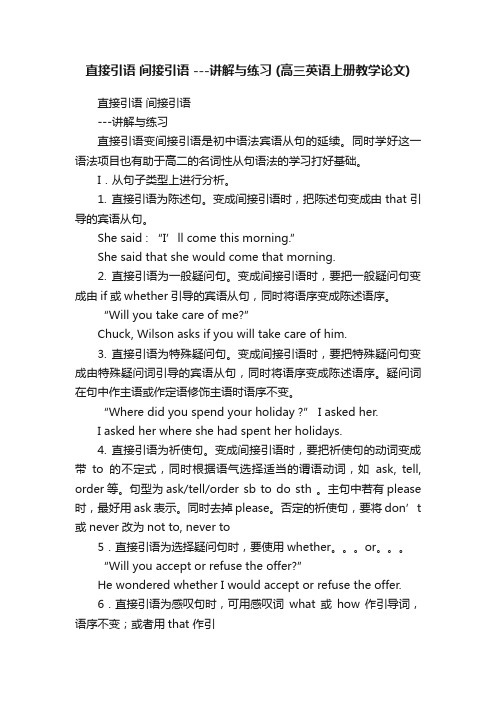
直接引语间接引语 ---讲解与练习 (高三英语上册教学论文)直接引语间接引语---讲解与练习直接引语变间接引语是初中语法宾语从句的延续。
同时学好这一语法项目也有助于高二的名词性从句语法的学习打好基础。
I.从句子类型上进行分析。
1. 直接引语为陈述句。
变成间接引语时,把陈述句变成由that引导的宾语从句。
She said : “I’ll come this morning.”She said that she would come that morning.2. 直接引语为一般疑问句。
变成间接引语时,要把一般疑问句变成由if或whether引导的宾语从句,同时将语序变成陈述语序。
“Will you take care of me?”Chuck, Wilson asks if you will take care of him.3. 直接引语为特殊疑问句。
变成间接引语时,要把特殊疑问句变成由特殊疑问词引导的宾语从句,同时将语序变成陈述语序。
疑问词在句中作主语或作定语修饰主语时语序不变。
“Where did you spend your holiday ?” I asked her.I asked her where she had spent her holidays.4. 直接引语为祈使句。
变成间接引语时,要把祈使句的动词变成带to的不定式,同时根据语气选择适当的谓语动词,如ask, tell, order等。
句型为ask/tell/order sb to do sth 。
主句中若有please 时,最好用ask表示。
同时去掉please。
否定的祈使句,要将don’t 或never改为not to, never to5.直接引语为选择疑问句时,要使用whether。
or。
“Will you accept or refuse the offer?”He wondered whether I would accept or refuse the offer.6.直接引语为感叹句时,可用感叹词what 或how 作引导词,语序不变;或者用that 作引导词,句子用陈述语序。
高中英语直接引语和间接引语讲解与练习
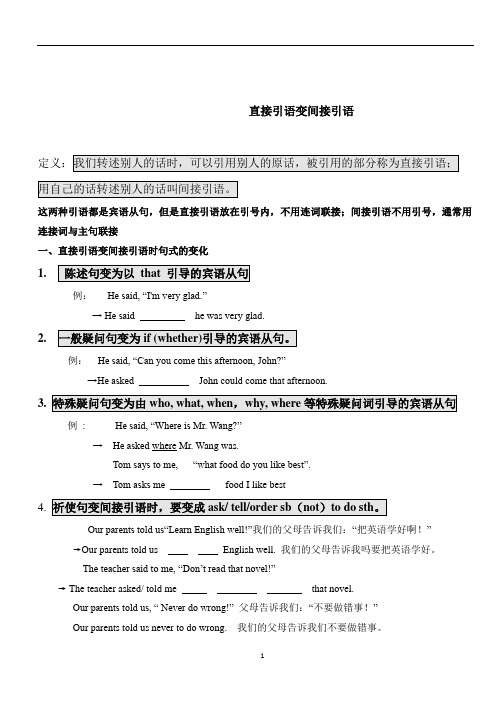
直接引语变间接引语这两种引语都是宾语从句,但是直接引语放在引号内,不用连词联接;间接引语不用引号,通常用连接词与主句联接一、直接引语变间接引语时句式的变化1.例:He said, “I'm very glad.”→ He said he was very glad.2.例:He said, “Can you come this afternoon, John?”→He asked John could come that afternoon.3.例: He said, “Where is Mr. Wang?”→ He asked where Mr. Wang was.Tom says to me, “what food do you like best”.→ Tom asks me food I like best4.Our parents told us“Learn English well!”我们的父母告诉我们:“把英语学好啊!”❼Our parents told us English well. 我们的父母告诉我吗要把英语学好。
The teacher said to me, “Don’t read that novel!”❼ The teacher asked/ told me that novel.Our parents told us, “ Never do wrong!” 父母告诉我们:“不要做错事!”Our parents told us never to do wrong. 我们的父母告诉我们不要做错事。
二、 人称的变化例如: “I went to the Great Wall yesterday,” Li Hua said.→ Li Hua said that he had gone to the Great Wall the day before.“I’ll come to help you whenever you need my help,” he answered her .→ He answered her that he would come to help her whenever she needed his help.She said to me, “Your pronunciation is better than his.” → She told me that my pronunciation was better than his.三、时态变化主句的谓语动词是一般过去时,四、 指示代词、时间状语、地点状语和动词的变化【拓展延伸】直接引语变为间接引语时时态不作改变的情况He says, “I’m tired.”→He says that he is tired.He will say, “The boy was lazy.”→He will tell you that the boy was lazy.Our geography teacher s aid to us, “The earth goes round the sun.”→Our geography teacher told us that the earth goes round the sun.She said, “I was born in 1995.”→ She said that she was born in 1995.【典型例题】(1)Can you tell me_______?A. what the matter isB. what matter it isC. what’s the matterD. the matter is what(2)The physics teacher said the earth ____around the sun.A. is movingB. movedC. had movedD. moves直接引语变间接引语练习题一、将所给直接引语变为间接引语,每空一词:1. “I never eat meat.” he said.He said that ______ never ______ meat.2. “I’ve found my wallet.” he said to me.He ______ me that he ______ ______ ______ wallet.3. “I took it home with me.” she said.She said that ______ ______ _______ it home with her.4. The teacher said, “The sun rises in the east and goes down in the west.”The teacher said that the sun ______ in the east and ______ down in the west.5. “I met her yesterday.” he said to me.He ______ me that he ______ met the day ______.6. “You must come here before five.” he said.He said that I ______ to go ______ before five.7. “I bought the house 10 years ago.” he said.He said that he _______ bought the house 10 years _______. 8. “Did you see her last week?” he s aid.He ______ ______ I had seen her the week _______.9. He said, “You can sit here, Jim.”He ______ Jim that he ______ sit there.10. He asked, “How did you find it, mother?”He asked her mother ______ ______ ______ found it.11. “Where have you been these days?” he asked.He asked me _______ _______ _______been _______ days. 12. “Do you know where she lives?” he asked.He asked ______ ______ knew where she ______.13. “Stop making so much noise, children.” he said.He ______ the children ______ ______ making so much noise.14. “Don’t tell him the news.” she said.She told me _______ ______ ______ him the news.15. “I am having supper,” he said.He said that _______ _______ having supper.16. “I’ve seen the film,” Gina said t o me.Gina _______ me that she _______ _______ the film.17. “I went home with my sister,” she said.She said that _______ _______ _______ home with her sister.18. “Keep quiet, children.” he said.He _______ the children _______ _______ quiet.20. “Don’t look out of the window,” she said.She told me _______ _______ _______ out of the window.。
高中直接引语和间接引语详解和习题

直接引语和间接引语详解与习题一、直接引语和间接引语的定义1. 直接引语:别人直接说的话,一般直接放在引号内。
如:(1) My mother told me, “You should finish your homework first, then you can play with your friends.”(2) Our teacher said, “Class is over, we should have a rest.”2. 间接引语:用自己的话加以转述,被转述的话不放在引号内。
上面两个例句变成间接引语应该是:(1) My mother told me that I should finish my homework first and then I could go out and play with my friends.(2) Our teacher said class was over and we should have a rest.二、直接引语与间接引语的变化直接引语变成间接引语时,由于引述动词(said, told等)一般都是过去时形式,因此间接引语中的动词时态、人称代词、限定词、时间状语、地点状语等一般都要做相应的变化。
有下面几种情况:1. 现在时间推移到过去时间所谓现在时间推移到过去时间指一般现在时变为一般过去时,现在进行时变成过去进行时,现在完成时变成过去完成时。
例如:She said, “I am hungry.” T She said (that) she was hungry.Vince said, “I have found what,s wrong with the computer.” T Vince said he had found what was wrong with the computer.在下列场合,尽管陈述动词为过去时形式,间接引语中的动词时态却不必改变,即:(1)当引述的是客观事实、科学真理、现在习惯工作以及格言等内容时:He said, “The word 'laser, is an acronym首字母缩略词).” T He said the word 'laser,is an acronym.(2)当动词所表示的状态或动作在引述时仍在继续时:“I,m forty,” he said. t He said he is forty.(3)当谓语动词包含无过去时形式的情态助动词时:He said, “It must be pretty late. I really must go.” — He said it must be pretty late, and he really must go.He said, “You mustn’t smoke in the room.”—He said I mustn’t smoke in the room. 2. 过去时间推移到过去的过去这里需要注意以下几点:(1)当强调动作或状态先于引述动词时,一般过去时要变成过去完成体。
直接引语变间接引语练习题

直接引语变间接引语练习题直接引语变间接引语练习题在英语学习中,直接引语和间接引语是常见的语法知识点。
直接引语是指直接引述别人的话,而间接引语则是将别人的话转述成自己的话。
掌握直接引语变间接引语的规则对于提高英语口语和写作能力非常重要。
下面是几个直接引语变间接引语的练习题,帮助大家巩固这一知识点。
1. 直接引语:"I love reading books," she said.间接引语:She said that she loved reading books.2. 直接引语:"I will visit my grandparents next week," he said.间接引语:He said that he would visit his grandparents the following week.3. 直接引语:"I am going to the supermarket," she said.间接引语:She said that she was going to the supermarket.4. 直接引语:"I have already finished my homework," he said.间接引语:He said that he had already finished his homework.5. 直接引语:"I can swim very well," she said.间接引语:She said that she could swim very well.6. 直接引语:"I won the first prize in the competition," he said.间接引语:He said that he had won the first prize in the competition.7. 直接引语:"I want to be a doctor when I grow up," she said.间接引语:She said that she wanted to be a doctor when she grew up.8. 直接引语:"I saw a movie last night," he said.间接引语:He said that he had seen a movie the previous night.9. 直接引语:"I don't like spicy food," she said.间接引语:She said that she didn't like spicy food.10. 直接引语:"I will call you later," he said.间接引语:He said that he would call me later.通过以上练习题,我们可以看到直接引语变间接引语的一些规律。
直接引语和间接引语讲解和练习(答案)

直接引语和间接引语直接引述别人的原话,叫做直接引语;用自己话转述别人的话,叫做间接引语。
间接引语一般构成宾语从句。
直接引语必须放在引号内,间接引语则不用引号。
直接引语改为间接引语时,除将引语部分变成宾语从句外,还必须对直接引语中的人称、时态、指示代词、时间状语、地点状语等进行改变。
直接引语转成间接引语的时态变化:1、当主句谓语动词是一般现在时态或一般将来时态宾语从句的谓语动词的时态不作任何变化。
如:He said, ”We help each other. ” = He said that they help each other.She said, ” I have bought a dictionary. ” = She said that she had bought a dictionar y.She said, ” He will go to the hospital. ” = She said that he would go to the hospital.注意:主句谓语动词是一般过去时态动词表示客观真理仍用一般现在时态,不必变为过去时态。
如:The teacher said, “Light travels much faster than sound.”= The teacher said light travels much faster than sound.2.在人称方面存在人称的变化,变化规律常常是:(1)直接引语中的第一人称常跟主句的主语一致。
e.g.He said,“I have finished my homework.”→He said(that)he had finished his homework.(2)直接引语中的第二人称常常依主句中位于动词后面的谈话对象而定,若后面没有谈话对象,则常变为第一人称。
e.g.Tom said,“You must finish your homework today.”→Tom said I had to finish my homework that day.(3)直接引语中的第三人称变为间接引语时, 常不变。
高中英语 直接引语和间接引语专项能力强化训练附参考答案
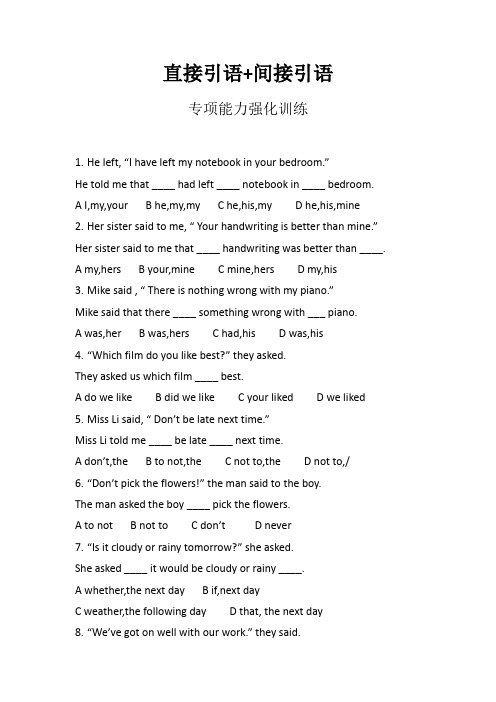
直接引语+间接引语专项能力强化训练1.He left, “I have left my notebook in your bedroom.”He told me that ____ had left ____ notebook in ____ bedroom.A I,my,yourB he,my,myC he,his,myD he,his,mine2.Her sister said to me, “ Your handwriting is better than mine.”Her sister said to me that ____ handwriting was better than ____.A my,hersB your,mineC mine,hersD my,his3.Mike said , “ There is nothing wrong with my piano.”Mike said that there ____ something wrong with ___ piano.A was,herB was,hersC had,hisD was,his4.“Which film do you like best?” they asked.They asked us which film ____ best.A do we likeB did we likeC your likedD we liked5.Miss Li said, “ Don’t be late next time.”Miss Li told me ____ be late ____ next time.A don’t,theB to not,theC not to,theD not to,/6.“Don’t pick the flowers!” the man said to the boy.The man asked the boy ____ pick the flowers.A to notB not toC don’tD never7.“Is it cloudy or rainy tomorrow?” she asked.She asked ____ it would be cloudy or rainy ____.A whether,the next dayB if,next dayC weather,the following dayD that, the next day8.“We’ve got on well with our work.” they said.They said that they ____ on well with their work.A has gotB have gotC had gotD got9.“They discussed the question three days ago, “ they said.They said they ____ the question three days ____.A had discussed,beforeB had discussed,afterC was discussing,beforeD discussed,later10.“Did you get in touch with Comrade Wang yesterday?” she asked me. She asked me if we had got in touch with Comrade Wang ____.A the day beforeB the day agoC the day before yesterdayD the day later11.She said to her child, “ You must do as you are told.”She said to her child that he ____ as he ____.A did,was toldB had to do,toldC must do,was toldD need to,was told12.“Was there any differences between British English and American English?” asked Bob.Bob asked me ____ there ___ any differences between British English and American English.A if,wasB whether,areC if,hadD whether,were13.John said to his younger sister, “ You may come with me.”John told his younger sister that ____ with him.A you might goB she might goC she may comeD she had to go14.“What time will you come to see us tomorrow?” they asked.They asked me what time ____ to see ___ the next day.A you would go,usB would I come, themC you would go,themD I would go,them15.“Has your headmaster been to Australia?” the girl asked.The girl asked me if my headmaster ____ to Australia.A had beenB has beenC had goneD went16.The manager asked his men, ”Is the plan being carried out successfully?”The manager asked his men whether ____ carried out successfully.A the plan wasB the plan beingC was the plan beingD the plan was being17.“If it doesn’t rain tomorrow, I shall go shopping,” Mother said to me. Mother told me if it ____ the next day, she ____ go shopping.A rains, won’tB not rained,wouldC doesn’t rain, willD didn’t rain, would18.“Are you going to hold the celebration today or tomorrow?”Fred asked Joan.Fred asked Joan if she was going to hold the celebration ____ or ____.A this day,that dayB that day,the next dayC yesterday,next dayD that day,next day19.“Where did you go the day before yesterday?” the boss asked the clerk.The boss asked the clerk where he had gone ____.A these daysB two days beforeC the other dayD the day before20.“Drop in the day after tomorrow if you are free,” I said to Henry.I told Henry to drop in ____ if he was free.A the other dayB in two days’ timeC the day beforeD the next day参考答案:1-5 CADDC 6-10 BACAA 11-15 CDBDA 16-20 DDBBB。
直接引语变间接引语语法讲解及专项练习(含答案)

直接引语变间接引语语法讲解(内部资料,仅供参考)一. 直接引语和间接引语的定义直接引语是直接引述别人的原话,原话有引号,被引用或复述的部分被称为直接引语。
用自己的话转述别人的话,被转述的部分被称为间接引语。
间接引语通常在句中以宾语从句的形式出现。
二. 直接引语变为间接引语的方法(1)人称人称变化可以遵循如下顺口溜“一随主,二随宾,第三人称不更新”。
“一随主”是指在直接引语变间接引语时,如果从句中的主语是第一人称或被第一人称所修饰。
从句中的人称要按照主句中主语的人称变化,如:She said. “My brother wants to go with me.”→She said her brother wanted to go with her.“二随宾”是指直接引语变间接引语时,若从句中的主语及宾语是第二人称,或被第二人“你”所修饰,从句中的人称要跟引号外的主句的宾语一致。
如果引号外的主句没有宾语,也可以用第一人称,如:He said to Kate,"How is your sister now?"→He asked Kate how her siste r was then.“第三人称不更新”是指直接引语变间接引语时,如果从句中的主语及宾语是第三人称或被第三人称所修饰从句中的人称一般不需要变化,如:Mr. Smith said,“Jack is a good worker.”→Mr. Smith said Jack was a good worker.(2)时态直接引语在改为间接引语时,时态需要做相应的调整。
也就是说从句时态要和主句时态一致。
如果从句是过去时,主句要向后退一个时态,变成一般过去时。
1. She said. “I have lost a pen.” →She said she had lost a pen.(现在完成——过去完成)2. She said. “We hope so.” →She said they hoped so.(一般现在—一般过去)3. She said,“He will go to see his friend。
完整版)直接引语和间接引语练习题(附答案)

完整版)直接引语和间接引语练习题(附答案)1."Could you tell me where the post office is?" asked the person。
"Yes。
it's next to the supermarket," replied the other.2.My brother said he was watching TV at that moment.3."Do you know how far it is to the nearest hospital from here?" asked the person。
"It's about ten minutes' walk," replied the other.4."Do you know how much she paid for the new computer yesterday?" asked the person。
"Sorry。
I have no idea," replied the other.5."When will Jenny come back from her holiday?" wondered the person.6."Would you please tell me where you bought this book?" asked the person.1.My sister told me that she was leaving for London the following week.2.John said that Mr。
Smith had arrived.3.She asked if I wanted her to help me.4.She asked if the man in the shop had found his wallet.5.Mum asked the er if they could speak English.6.He asked the boy how many people were in their family.7.He told me that he had left his book in my room.8.Kitty said that she would call again after supper that evening。
高中英语语法 直接引语和间接引语含练习题
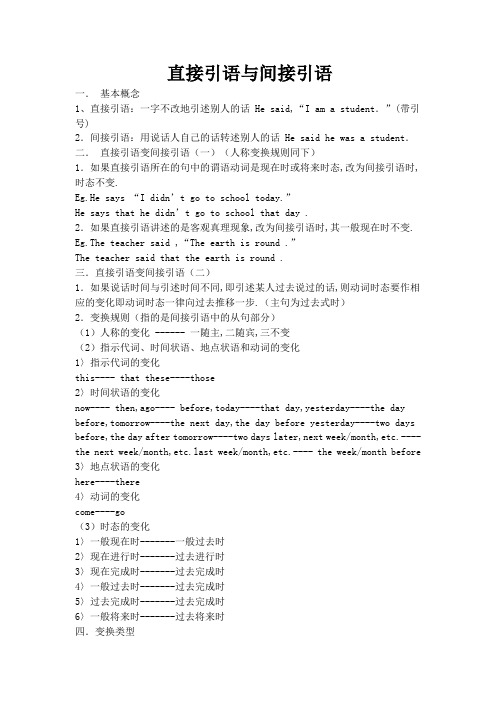
直接引语与间接引语一.基本概念1、直接引语:一字不改地引述别人的话He said,“I am a student.”(带引号)2.间接引语:用说话人自己的话转述别人的话 He said he was a student.二.直接引语变间接引语(一)(人称变换规则同下)1.如果直接引语所在的句中的谓语动词是现在时或将来时态,改为间接引语时,时态不变.Eg.He says “I didn’t go to school today.”He says that he didn’t go to school that day .2.如果直接引语讲述的是客观真理现象,改为间接引语时,其一般现在时不变. Eg.The teacher said ,“The earth is round .”The teacher said that the earth is round .三.直接引语变间接引语(二)1.如果说话时间与引述时间不同,即引述某人过去说过的话,则动词时态要作相应的变化即动词时态一律向过去推移一步.(主句为过去式时)2.变换规则(指的是间接引语中的从句部分)(1)人称的变化 ------ 一随主,二随宾,三不变(2)指示代词、时间状语、地点状语和动词的变化1〉指示代词的变化this---- that these----those2〉时间状语的变化now---- then,ago---- before,today----that day,yesterday----the day before,tomorrow----the next day,the day before yesterday----two days before,the day after tomorrow----two days later,next week/month,etc.---- the next week/month,st week/month,etc.---- the week/month before 3〉地点状语的变化here----there4〉动词的变化come----go(3)时态的变化1〉一般现在时-------一般过去时2〉现在进行时-------过去进行时3〉现在完成时-------过去完成时4〉一般过去时-------过去完成时5〉过去完成时-------过去完成时6〉一般将来时-------过去将来时四.变换类型1.直接引语为陈述句直接引语为陈述句,用that引导(口语中可以省略).e.g.直接引语:The teacher told the students,“I will give you a surprise.”间接引语:The teacher told the students that she would give them a surprise.2.直接引语为疑问句(1)直接引语为一般疑问句时,由whether或if引导,用陈述句的语序e.g.直接引语:He said to us,“Are you going away today?”间接引语:He asked us whether/if we were going away that day.直接引语为疑问句(2)直接引语为特殊疑问句时,其关联词用相应的疑问代词或疑问副词,其后用陈述语序e.g.直接引语:She asked,“Who will help me finish the job?”间接引语:She asked who would help her finish the job.e.g.直接引语:He asked,“What have you done?”间接引语:He asked what I had done.直接引语为疑问句(3)直接引语为选择疑问句,变为间接引语时应用whether…or…e.g.直接引语:“Do you like tea or coffee?” she asked me.间接引语:She asked me whether I liked tea or coffee.3.直接引语为祈使句直接引语为祈使句,变为间接引语时将祈使句的动词原形变为带to的不定式.它的否定是在to前加not.它没有时态的变化.其他的变化和直接引语是陈述句的情况相同.e.g.直接引语:I said to her,“Please give me a glass of water.”间接引语:I asked her to give me a glass of water.直接引语:He said,“Don’t make so much noise,boys.”间接引语:He told the boys not to make so much noise.4.直接引语为感叹句直接引语若是感叹句,变为间接引语时多采用宾语从句结构,即可用what或how 引导,也可用that引导e.g.直接引语:“ What a clever boy you are!” ,my teacher said to him.间接引语:My teacher told him what a clever boy he was.My teacher told him that he was a very clever boy.英语小题集练——直接引语和间接引语1、— Could you tell me ______?—Yes. It’s next to the supermarket.A.where the post office isB.where was the post officeC.where is the post officeD.where the post office was2、My brother said, “I’m watching TV now.”My brother said watching TV .A.he, was, now B.I, was, thenC.I, am, that day D.he, was, then3、—Do you know____________?—It’s about ten minutes’ walk.A.how many minutes do you walk to the nearest hospitalB.which is the way to the nearest hospitalC.how long did you reach the nearest hospitalD.how far it is to the nearest hospital from here4、-- Do you know ________ the new computer yesterday? -- Sorry, I have no idea.A.how much did she pay for B.how much will she pay forC.how much she paid for D.how much she will pay for5、Jenny is on holiday now. I wonder ________.A.when she will come back B.when she came backC.when will she come back D.when did she come back6、Would you please tell me ______ this book?A.where you bought B.where did you buyC.where you buy D.where do you buy7、— Could you tell me_____ ?— About half an hour.A.how long it takes to walk to the Science and Technology Museum from schoolB.how long it took to walk to the Science and Technology Museum from schoolC.how far was it to walk to the Science and Technology Museum from schoolD.how far it was to walk to the Science and Technology Museum from school8、I ______ that he’s a hardworking teacher.A.never doubt B.always doubt C.seldom ask D.often wonder答案1、2、3、4、5、6、7、8、直接引语和间接引语专项练习一、把下列的句子变成间接引语:1. “I’m leaving for London next week.” My sister said to me.2. John said, “Mr. Smith has come here.”3. She said, “Do you want me to help you?”4. “Does the man in the shop find his wallet at last?” She said.5. Mum said to the newcomer, “Can you speak English?”6. “How many people are there in your family?” He asked the boy.7. He said to me, “I have left my book in your room.”8. Kitty said “I’ll call again after supper this evening.”9. She said, “I will come here again tonight.”10. He said, “I arrived yesterday morning.”11. She said , “My sister will be back tomorrow morning.”12. “Who lives next door?” she asked.13. He said , “I have lost my umbrella.”14. Paul said, “I’m trying to get a taxi.”15. “Frank, I came to return you the book,” Henry said.16. He asked me, “Are you a teacher or a student?”二、把下列句子变成直接引语:23. Father asked me who had broken the window.24. She asked me which one I liked the best.25. He asked whether I had watched TV the night before.26. Jim asked me if I was busy that day.27. Pick said that he would take Mary there the next time.三、扩展练习:宾语从句。
高二英语直接引语与间接引语基础单选题40题
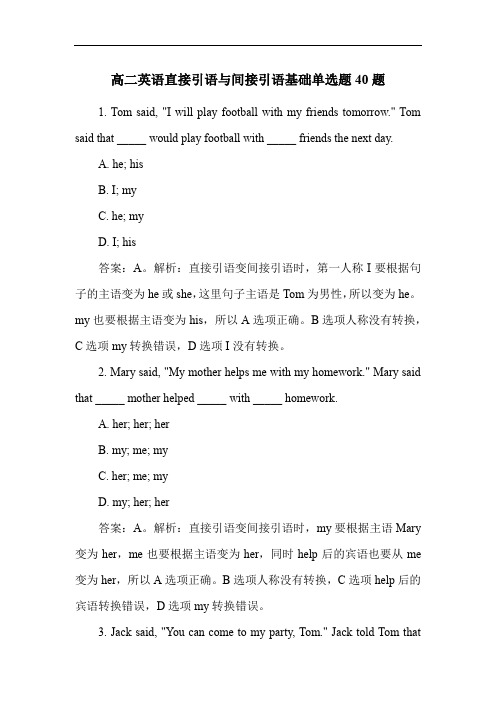
高二英语直接引语与间接引语基础单选题40题1. Tom said, "I will play football with my friends tomorrow." Tom said that _____ would play football with _____ friends the next day.A. he; hisB. I; myC. he; myD. I; his答案:A。
解析:直接引语变间接引语时,第一人称I要根据句子的主语变为he或she,这里句子主语是Tom为男性,所以变为he。
my也要根据主语变为his,所以A选项正确。
B选项人称没有转换,C选项my转换错误,D选项I没有转换。
2. Mary said, "My mother helps me with my homework." Mary said that _____ mother helped _____ with _____ homework.A. her; her; herB. my; me; myC. her; me; myD. my; her; her答案:A。
解析:直接引语变间接引语时,my要根据主语Mary 变为her,me也要根据主语变为her,同时help后的宾语也要从me 变为her,所以A选项正确。
B选项人称没有转换,C选项help后的宾语转换错误,D选项my转换错误。
3. Jack said, "You can come to my party, Tom." Jack told Tom that_____ could come to _____ party.A. he; hisB. you; myC. he; myD. you; his答案:A。
解析:直接引语中的you指的是Tom,变间接引语时要根据句子主语Jack变为he,my也要根据Jack变为his,所以A选项正确。
高中英语直接引语变间接引语练习题(答案)(2021年整理)
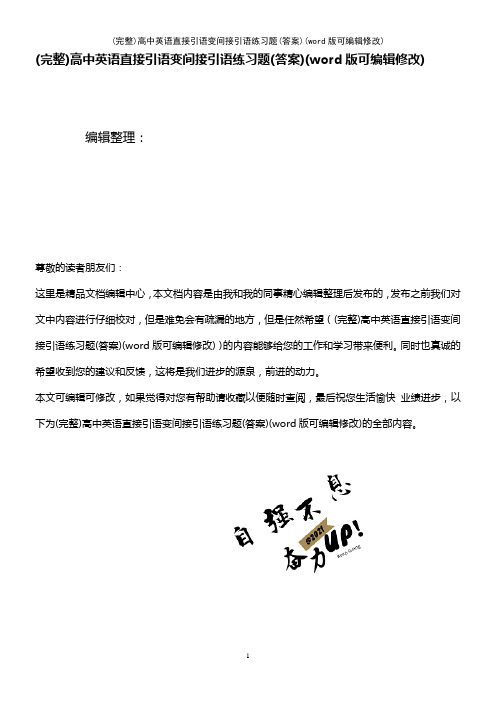
(完整)高中英语直接引语变间接引语练习题(答案)(word版可编辑修改) 编辑整理:尊敬的读者朋友们:这里是精品文档编辑中心,本文档内容是由我和我的同事精心编辑整理后发布的,发布之前我们对文中内容进行仔细校对,但是难免会有疏漏的地方,但是任然希望((完整)高中英语直接引语变间接引语练习题(答案)(word版可编辑修改))的内容能够给您的工作和学习带来便利。
同时也真诚的希望收到您的建议和反馈,这将是我们进步的源泉,前进的动力。
本文可编辑可修改,如果觉得对您有帮助请收藏以便随时查阅,最后祝您生活愉快业绩进步,以下为(完整)高中英语直接引语变间接引语练习题(答案)(word版可编辑修改)的全部内容。
直接引语变间接引语专练题1. He asked ________ for the computer。
A。
did I pay how much B。
I paid how muchC. how much did I pay D。
how much I paid2. “Have you seen the film?" he asked m e。
→He asked me _______.A. had I seen the filmB. have I seen the filmC。
if I have seen the film D。
whether I had seen the film3。
“Please close the window," he said to me。
→He ______ me _____ the window。
A。
said to; to close B。
told to; closingC。
asked ; to close D. said to; please close4. “I am a teacher,” Jack said。
→He said _________。
高二英语直接引语和间接引语知识精讲 试题
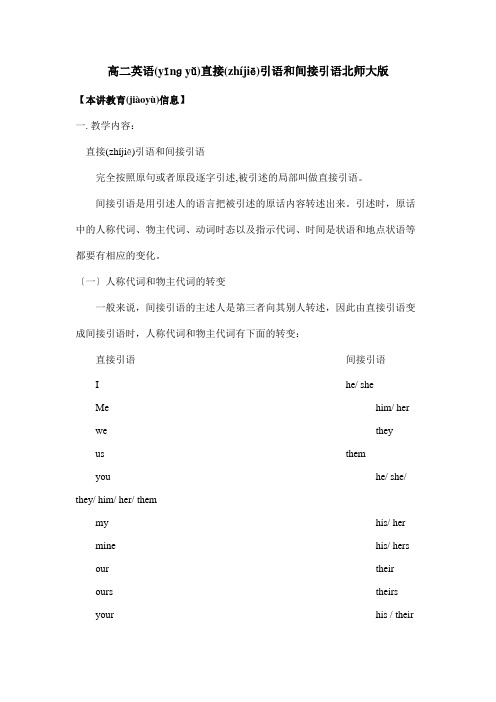
高二英语(yīnɡ yǔ)直接(zhíjiē)引语和间接引语北师大版【本讲教育(jiàoyù)信息】一. 教学内容:直接(zhíjiē)引语和间接引语完全按照原句或者原段逐字引述,被引述的局部叫做直接引语。
间接引语是用引述人的语言把被引述的原话内容转述出来。
引述时,原话中的人称代词、物主代词、动词时态以及指示代词、时间是状语和地点状语等都要有相应的变化。
〔一〕人称代词和物主代词的转变一般来说,间接引语的主述人是第三者向其别人转述,因此由直接引语变成间接引语时,人称代词和物主代词有下面的转变:直接引语间接引语I he/ sheMe him/ her we theyus themyou he/ she/ they/ him/ her/ themmy his/ her mine his/ hers our theirours theirsyour his / theiryours his/ theirs例如(lìrú):He said, “I have lost my umbrella.〞He said that he had lost his umbrella.She said, “The book on the table is mine.〞She said the book on the table was hers.但是,假如引述人不同(bù tónɡ)或者详细情况不同,人称代词和物主代词的转变也随之不同。
“I know,〞 said Crawley, “but I love to hear you say it.〞1. Crawley answered that he knew, but he loved to hear me say it.2. I (Crawley) answered that I knew but I loved to hear him/ her say it.3. 第三者转述(zhuǎnshù)a. 第三者转告(zhuǎn ɡào)其别人Crawley answered that he knew but he loved to hear him/ her say it.b. 第三者提醒听话者Crawley answered that he knew but he loved to hear you say it.c. 第三者复述给说话者You (Crawley) answered that you knew, but you loved to hear him/ her say it. 〔二〕时态的转变1. 主句的时态是过去时,直接引语的谓语动词按照时态一致的原那么,在变成间接引语时做如下的变化:直接引语间接引语如今一般时态过去一般时态过去一般时态(shí tài) 过去完成时态将来一般时态(shí tài) 过去一般将来时态如今进展(jìnzhǎn)时态过去进展时态过去进展时态(shí tài) 过去完成进展时态将来进展时态过去将来进展时态如今完成时态过去完成时态过去完成时态过去完成时态将来完成时态过去将来完成时态如今完成进展时态过去完成进展时态过去完成进展时态过去完成进展时态将来完成进展时态过去将来完成进展时态例如“I am afraid that arguments don’t make a difference..〞said he with a smile.He said with a smile that he was afraid that arguments didn’t make a difference.So he said to me, “You don’t know what you are talking about.〞So he said to me I didn’t know what I was talking about.“I did not suppose that you had done it on purpose.〞 she said.She said that she had not supposed that he had done it on purpose.“I have won the match already.〞 claimed my friend.My friend claimed that he had won the match already.I said,“I shall be there.〞I said I should be there.2. 主句谓语动词虽然是过去(guòqù)时,但在下面情况中间接引语的谓语动词时态不变。
unit-11-间接引语复习
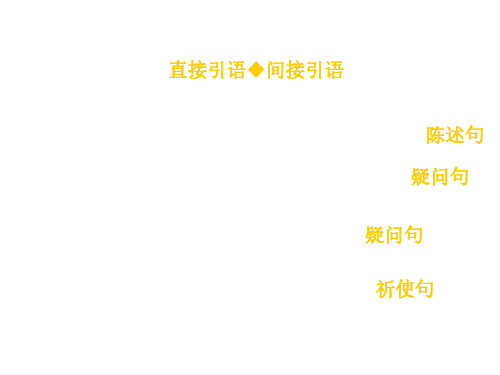
直接引语◆间接引语 直接引语:说话人的原话,引号内的部分
1. They said: “We’re not speaking to you.” 陈述句
2. “ Are you ready now?” mother asked her boy.
一般疑问句
3. “Why are you sitting here all alone?” I asked the girl
特殊疑问句
4. “Don’t swim out too far, boys” I said
祈使句
讲解:将打开引号。这时, 人称、时态、语序、时间、地点都要有必要的变化。
1、将陈述句转化成间接引语:句型是:said (that) 或told sb that,其中that 可以省略不用。
Mother asked her boy if (whether) he was ready then.
3、将特殊疑问句转化成间接引语,句型是:asked + 原句中的疑问词。
“Why are you sitting here all alone?” I asked the girl.
I asked the girl why she was sitting there all
With the rapid growth of hi-tech skills, cellphone has become increasingly important in our daily life.
Recently the issue/ problem of...has been brought into focus/ brought to public attention/ in the limelight/ posed among the public.
- 1、下载文档前请自行甄别文档内容的完整性,平台不提供额外的编辑、内容补充、找答案等附加服务。
- 2、"仅部分预览"的文档,不可在线预览部分如存在完整性等问题,可反馈申请退款(可完整预览的文档不适用该条件!)。
- 3、如文档侵犯您的权益,请联系客服反馈,我们会尽快为您处理(人工客服工作时间:9:00-18:30)。
CHAPTER11 直接引语与间接引语 - 提升训练一、单项选择(共10小题;共10分)1. He told me that they enough money for the project proudly.A. collectB. are collectingC. will collectD. had collected2. We asked the teacher how the earth around the sun.A. movedB. moveC. movesD. had moved3. Jim asked we would set off early in the next morning.A. whatB. thatC. whetherD. which4. Last night at twelve o'clock, he phoned me and said he TV.A. still watchesB. was still watchingC. has still watchedD. had still watched5. John asked me to visit his uncle's farm with him.A. how would I likeB. if or not would I likeC. whether I would likeD. which I would like6. Can you tell me the railway station?A. how I can get toB. how can I get toC. where I can get toD. where can I get to7. I asked my lawyer say in court .A. what I shouldB. what should IC. how I shouldD. how should I8. They asked me to have a drink with them. I said that it was at least 10 years since I agood drink.A. had enjoyedB. was enjoyingC. enjoyedD. had been enjoying9. The reporter said that the UFO east to west when he saw it.A. was travelingB. traveledC. had been travelingD. has traveled10. On his way home from Beijing he told me he Beijing again.A. had visitedB. has visitedC. would visitD. will visit二、翻译(全句翻译)(共15小题;共15分)11. 我告诉他我丢了钱并会找到这笔钱。
12. 她问我第二天有没有空。
13. 我问她第二天去哪里去干什么。
14. 他爸爸告诉他不要穿着新外套去爬树。
15. 这个陌生人问我的名字是什么。
16. 他说:"我把书落在你房间了。
"17. 她说:"他会很忙的。
"18. 她对汤姆说:"你能帮我吗?"19. "Where does your chemistry teacher live, Karen?" the young man asked.20. "I have gained the first place in the mathematics competition," the little boy said happily.21. "Light travels faster than sound," the physics teacher said to the boys and girls.22. "Will you go to the concert with me this evening?" Mary asked me.23. "What did you do here yesterday?" the old man asked my brother.24. She asked what was the matter with me.25. He asked me if I was sure about that.三、短文改错(共5小题;共5分)请对标有题号的每一行做出判断:如正确,请写“正确”;如有错误,请改正,且每行只有一个错误。
It is saying not all people like to work but everyone likes to play. All over26. the world are known that men and women, boys and girls enjoy sports. 27.Since long ago, many adults and children called their friends together28.to spend hours, even days play games. My friends say, "One of the reasons29.people like to play is that sports help them to live happily."30.四、补全对话(填空)(共10小题;共10分)阅读下列材料,在空白处填入适当的内容(不多于3个单词)或括号内单词的正确形式。
David: Hi, Lily. Have you decided when you would take your summer vacation?Lily: Hi, David. I was planning to take it at the end of June, 31. my husband said he will be busy at that time. So we 32. (decide) to take in July, though it is quite hot then.David: Then 33. are you going?Lily: We'd like to visit some cities in Europe this time. You know, I'm quite 34. (excite) about it. I've never been to Europe before. There're so many great places 35. (enjoy). David: Sounds great. I'm sure you both will have a(n) 36. (relax) time there.Lily: Thanks. But there's one 37. for me.David: What's wrong?Lily: Oh, I'm just worried about my pet dog. When we're 38. , no one can take care of it. Maybe I have to send it to a pet hotel. I guess he will be quite upset about 39. .David: Oh, maybe I can 40. out. You see, I really love your dog and he seems to like me, too. And I think we can get along well with each other during your holiday.Lily: Oh, thank you so much.五、补全短文(共10小题;共10分)For Rachel's 9th birthday, she didn't ask for toys, dolls, or a new pair of shoes. Instead, the girl made a(n) 41. (self) wish. She said, "I want my friends and family to donate money to the group charity: Water, so that people in developing countries could have clean water 42. (drink)."Rachel's goal amount was $300, 43. she fell a bit short, raising $220 from her friends and relatives. 44. didn't bother her too much. She thought she could raise more the45. (follow) year.46. (luck), Rachel was involved in a highway accident. 47. spending several days in a hospital, she died on Saturday. But news of her 48. and the story of her great wish spread. So far, Rachel's fundraising page 49. donations from more than 4,000 people, adding up to over $84,000. All of the money will go towards building wells in developing countries, 50. will go a long way towards preventing the spread of disease."Life is coming out of this death, with Rachel's generosity," said one official.答案一、单项选择1. D2. C3. C4. B5. C6. A7. A8. A9. A 10. C二、翻译(全句翻译)11. I told him that I had lost my money and that I would find it.12. She asked whether I would be free the next day or not.13. I asked her where she was going and what she was going to do the next day.14. His father told him not to climb that tree in his new coat.15. The stranger asked me what my name was.16. He said, "I've left my book in your room."17. She said, "He will be very busy."18. She said to Tom, "Can you help me?"19. "卡伦,你的化学老师住在哪里?"年轻人问道。
